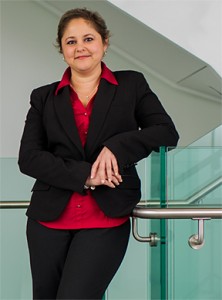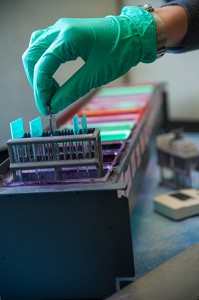By Eric Schuller
If you recently learned you have cancer, donating a sample of your cancer tissue to science is probably the last thing on your mind. But it’s a topic that you might discuss with someone on your health care team, because cancer researchers often rely on donated tissue samples to help them better understand what causes cancer and which treatments are most effective.
Whether to donate your tissue is a personal decision, but it can also be an altruistic one. Your donated tissue can help drive research that helps others in the future. For example, tumor samples have allowed researchers learn what drives certain cancer cells, understand how ethnicity and economic status may impact cancer treatment, and discover new cancer biomarkers.

When asked to donate tissue from her breast tumor, Dana-Farber patient Amy Atwood did not hesitate. “With something as noninvasive as tissue donation, why not do it?” she asks. “They’re taking it out during surgery anyway, so it’s not a big deal to donate.”
If you’re asked to donate tumor tissue for research, here are a few facts to consider.
- Donating tissue won’t change your treatment plan. During a medical procedure such as an operation, biopsy, or blood test, your doctor will remove the tissue needed for a complete pathology report. Then, with your consent, any leftover tissue can be sent to a tissue bank and saved for future research.
- Your donation may help drive innovation. Dana-Farber and its partners in care recently launched Profile, one of the nation’s most comprehensive personalized cancer medicine initiatives. The program gives patients the option of having their tumor tissue scanned for genetic mutations that are known or suspected of being linked to cancer. Researchers will use the resulting database in studies that seek to improve the effectiveness, safety, and precision of future cancer treatments.
 You are in control. Federal laws and regulations protect the privacy and confidentiality of your medical information, and tissue banks must follow those rules. When you donate tissue, you choose what information you want to share. For example, some patients prefer to donate tissue only, while others agree to share a limited amount of personal information, such as gender, age, racial or ethnic group, and history of smoking. Knowing details such as age and lifestyle can help researchers understand how these factors affect the risk of getting cancer.
You are in control. Federal laws and regulations protect the privacy and confidentiality of your medical information, and tissue banks must follow those rules. When you donate tissue, you choose what information you want to share. For example, some patients prefer to donate tissue only, while others agree to share a limited amount of personal information, such as gender, age, racial or ethnic group, and history of smoking. Knowing details such as age and lifestyle can help researchers understand how these factors affect the risk of getting cancer.
To learn more about tissue banking, talk with your doctor or nurse.


I have a pash tumor can you tell me any info and can I donate for research
Hi Kellie —
Thank you for your comment and for considering a tissue donation. This pamphlet on tissue banking covers some important questions that you may have. It also includes some contact information if you have further questions not covered in the booklet. I hope it is helpful and wish you all the best.